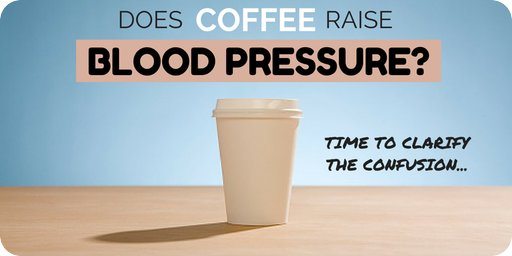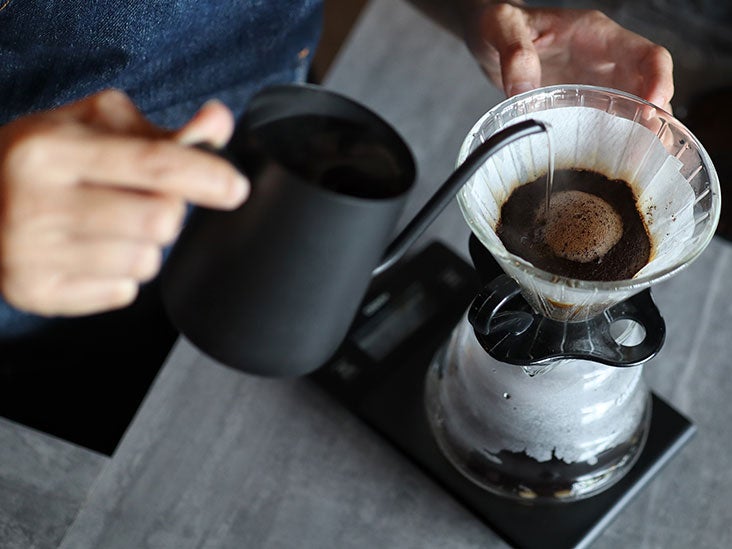


Methods of assessment of physical activity and alcohol intake varied over follow-up. Self-reports of smoking behavior and body weight have been validated in this cohort. Information on cigarette smoking, body weight, physical activity, and alcohol intake was obtained at baseline and at the same time points during follow-up as coffee drinking. The remaining 1017 white men who provided coffee information in medical school are the study population for the present analysis. Seventeen men with average systolic blood pressure of 140 mm Hg or higher or diastolic blood pressure of 90 mm Hg or higher in medical school were also excluded. Women were excluded from this analysis because of their small numbers.

For the present analysis, the mean level of all measurements was used to estimate blood pressure at baseline. 5 Blood pressure was assessed on multiple occasions (median of 9 measurements) in medical school using a standardized protocol. 4 Participants also underwent a standardized medical examination that included measurement of weight, height, blood pressure, and total serum cholesterol. In medical school, participants completed questionnaires about their medical history, family history of hypertension, health habits, and dietary habits including coffee intake and cigarette smoking. Betwmale and 111 female students (95% of those eligible) were enrolled. students who matriculated into the graduating classes of 1948 to 1964 of The Johns Hopkins University School of Medicine were eligible for the study. The Johns Hopkins Precursors Study was designed and initiated in 1947 by the late Caroline Bedell Thomas.
:max_bytes(150000):strip_icc()/200550535-001-56a47eef5f9b58b7d0d7471b.jpg)
The availability of repeated measures of coffee intake from young adulthood to age 60 years, as well as validated self-reports of blood pressure and hypertension, offers a unique opportunity to address this important issue. We examined the long-term effect of coffee drinking on blood pressure and risk of hypertension in The Johns Hopkins Precursors Study, 4 a prospective longitudinal study of former medical students. Such studies are necessary to determine if the pressor effect of coffee drinking seen in clinical trials is maintained over time and whether it translates into an increased risk of developing hypertension over the long-term. No prospective studies of coffee drinking and risk of developing hypertension have been performed. A recent meta-analysis of 11 clinical trials with a median duration of 56 weeks, however, demonstrated a persistent relationship between coffee intake and an increase in blood pressure. 1 Administration of coffee has been demonstrated to raise blood pressure acutely, 2 but adaptation to the cardiovascular effects of coffee drinking occurs quickly. After adjustment for the variables listed above, however, these associations were not statistically significant.Ĭonclusion Over many years of follow-up, coffee drinking is associated with small increases in blood pressure, but appears to play a small role in the development of hypertension.Ī LINK BETWEEN coffee drinking and increased blood pressure has been postulated for at least 60 years. Relative risk (95% confidence interval) of hypertension associated with drinking 5 or more cups a day was 1.35 (0.87-2.08) for baseline intake and 1.60 (1.06-2.40) for intake over follow-up. Compared with nondrinkers at baseline, coffee drinkers had a greater incidence of hypertension during follow-up (18.8% vs 28.3% P =. Results Consumption of 1 cup of coffee a day raised systolic blood pressure by 0.19 mm Hg (95% confidence interval, 0.02-0.35) and diastolic pressure by 0.27 mm Hg (95% confidence interval, 0.15-0.39) after adjustment for parental incidence of hypertension and time-dependent body mass index, cigarette smoking, alcohol drinking, and physical activity in analyses using generalized estimating equations. Blood pressure and incidence of hypertension were determined annually by self-report, demonstrated to be accurate in this cohort. Methods We assessed coffee intake in a cohort of 1017 white male former medical students (mean age, 26 years) in graduating classes from 1948 to 1964 up to 11 times over a median follow-up of 33 years. Shared Decision Making and Communicationīackground Whether the increase in blood pressure with coffee drinking seen in clinical trials persists over time and translates into an increased incidence of hypertension is not known.Scientific Discovery and the Future of Medicine.Health Care Economics, Insurance, Payment.Clinical Implications of Basic Neuroscience.Challenges in Clinical Electrocardiography.


 0 kommentar(er)
0 kommentar(er)
